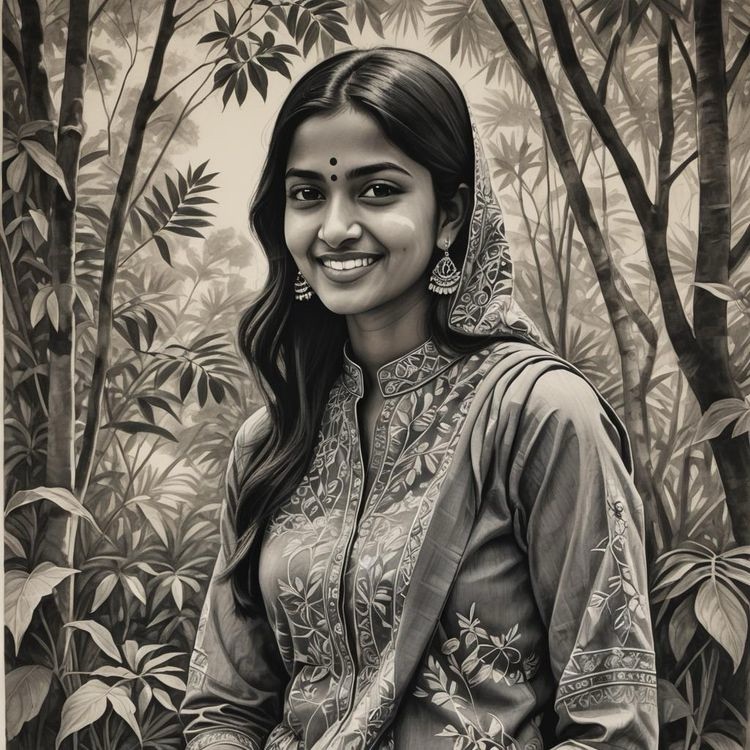In a quiet village nestled at the edge of a vast forest in India, there was an old tale whispered by the elders—a story of a woman known only as Oppression. She wasn’t a woman by any normal means, but a dark force, a final solution sent into the lives of those marked by fate for misery. Her name alone brought shivers down the spine of anyone who dared speak it aloud. But few knew her true form or what she was capable of. She came, cloaked in sweetness, masquerading as love, but behind her gentle words and kind eyes, her intentions were twisted, dark, and vengeful.
The village had not seen her in years. In fact, many believed her to be nothing more than a tale spun to frighten children. But as the old saying went, she came when one least expected her, drawn by those whose suffering could feed her insatiable appetite.
It began one monsoon season when the rains fell harder and longer than ever before. The crops were ruined, the animals were restless, and the once vibrant village was sinking into despair. Then, without warning, she arrived—her presence like a gust of fresh wind in the midst of suffocating humidity.
She was beautiful, with long black hair that flowed like a river and eyes that sparkled with warmth. Dressed in simple, elegant attire, she introduced herself as Meera, a widow from a faraway town. Her story was simple: she had no family left, and she had come seeking work. In a village plagued by so much misfortune, Meera seemed like a gift. She was gentle and kind, her laugh soft as the morning breeze. She quickly became beloved—especially by the men, who found themselves entranced by her grace. The women, too, welcomed her, comforted by her presence and her ability to soothe their worries with just a few words.
But soon, strange things began to happen.
In the home of the village head, where Meera had been given shelter, arguments erupted between husband and wife where once there had been peace. Small disagreements turned into vicious fights, and the headman’s children fell sick with mysterious fevers. The once-thriving family began to crumble under the weight of anger and misfortune. Meera, ever gentle, stayed by their side, offering comfort. Yet, it was as if her very presence stoked the flames of discord.
In another home, a young couple who had been trying for a child for years found themselves expecting within weeks of Meera’s arrival. Overjoyed, they credited her with their newfound happiness. But when the child was born, it was still and silent. The young mother wailed, and her husband blamed her. The joy Meera had brought them turned into a deep and bottomless sorrow.
It was then that an old woman in the village, Sita, began to suspect something was terribly wrong. Sita had lived through many storms and knew the signs of dark forces at play. She had seen Oppression once before, long ago, as a child. She had heard her mother speak of the witch, how she arrived wrapped in kindness but left only destruction in her wake.
Sita watched Meera closely, and soon, her suspicions were confirmed. Though she appeared to comfort those in need, Meera’s very touch seemed to siphon the life out of them. The more people suffered around her, the more radiant she seemed to become, as if she fed on their despair.
“She is not Meera,” Sita whispered to herself one night, the truth dawning on her like a cold wind. “She is Oppression.”
Determined to stop her, Sita gathered the villagers to confront Meera. But when they arrived at her doorstep, they found her standing outside, smiling that same sweet, innocent smile that had bewitched them all. The villagers, confused and still under her spell, hesitated. After all, what harm could this gentle woman do?
But Sita knew better. With trembling hands, she stepped forward, holding a pouch filled with sacred ash. “We know who you are,” Sita said, her voice strong despite her fear. “You bring nothing but suffering. Leave this village, or face the consequences.”
Meera’s smile faltered, and for the first time, the villagers saw something shift in her eyes—something cold, ancient, and malevolent. Her voice, once soft and melodic, turned sharp as steel. “You think you can banish me, old woman?” she hissed. “I am not some mere witch to be frightened off by superstition. I am Oppression, and I am eternal. Wherever there is despair, wherever hearts are weak, I will thrive.”
With a flick of her wrist, Meera’s guise began to fade. Her beautiful skin cracked, revealing a grotesque form beneath—a creature with eyes like endless pits of darkness, her once-flowing hair now coiling like snakes. The villagers screamed, backing away in horror.
But Sita stood firm. Chanting under her breath, she threw the sacred ash at Oppression, and the creature shrieked, her form flickering like a dying flame. The old woman’s voice rang out: “You may feed on suffering, but you will not take this village. Be gone, spirit, back to the shadows where you belong!”
With one last piercing scream, Oppression vanished, her form dissolving into the night like mist under the morning sun. The villagers, shaken but relieved, slowly regained their senses. They thanked Sita, though the sorrow and damage left behind would take years to heal.
The village never saw Oppression again, but her legend lived on. And they knew, wherever misery and hopelessness lurked, she would always be waiting—hidden behind a smile, wrapped in the guise of kindness, ready to feed on the suffering of those who let her in.
For Oppression was never truly gone. She was eternal, and she would always find her way back.
